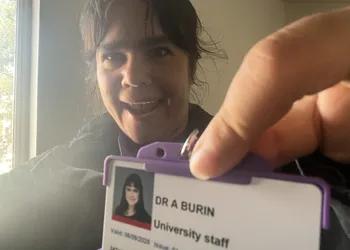Warwick Law School News
Warwick Law School News
The latest updates from our department
Warwick Law School welcomes new Assistant Professor
 Warwick Law School welcomes a new Assistant Professor to our community.
Warwick Law School welcomes a new Assistant Professor to our community.
Achas Burin joins us from Oxford Brookes University where she taught tort and medical law and developed a book proposal based on her PhD. She studied her PhD at the University of Oxford (2015–2022) where she also taught at Somerville College. She taught tort, constitutional law and jurisprudence alongside founding “Alternative Curricula” – a postcolonial and decolonial reading group – together with an anthropologist colleague. Outside law, Achas published a creative non-fiction essay in the journal Fourth Genre (‘Love in a Time of Dementia’). Between 2013–2015, she qualified as a barrister, eventually specialising in Public Inquiries, practising law alongside academia throughout this time.
When asked about joining Warwick Law School as a faculty member, Achas told us:
“Everything about joining Warwick delights me, except the CrossCountry trains. It’s a really exciting and vibrant department, and I look forward to making friends amongst all the lovely people I’ve met and have yet to meet.”
We chatted more…
What will you be doing at Warwick?
I’ll teach Tort Law and Understanding Law in Context, and I’ll keep working on the PhD/book. I’m also especially keen to engage with CELPA and the Africa Hub.
What are your research interests?
Broadly, private law theory – but particularly tort and property – and then, randomly, public inquiries. In terms of research methods, I’m interested in postcolonial and decolonial approaches to scholarship. However, unfortunately for me, there is very little that I find uninteresting.
I suppose it’s easiest to talk about my book: I examine the paradox that it is legally possible to own property, according to one branch of the law, and yet to commit theft of the same item according to another branch of the law.
Most people assume that once we buy something, we cannot be convicted of stealing it. We expect a joined-up property regime, but this expectation does not always hold. For instance, in the 2001 Hinks case, Karen Hinks was given lavish gifts by a man whom she was caring for. Though the gifts were valid under property law, she was convicted of theft under criminal law, because different areas of law are each allowed to pursue independent objectives. The disconnect between property law and criminal law is more widespread than just this case. The disconnect highlights how law sometimes fails to reflect public expectations about how legal rules should work.
I then explore the deeper implications of the fact that disconnect is arguably inevitable. Ultimately, I raise a question about a form of social ordering that is very familiar to us, i.e. a legal system which splits the regulation of private property into separate branches: property law and criminal law. I question how well law is suited for a purpose that traditional thinkers claim it is uniquely suited for – instituting private property.
Why did you want to study law?
I wanted to study law because I wanted to understand everything, and to up-end power structures. By the end of my degree, I realised that I understood very little and that it would not be so easy to up-end power structures. Achievement unlocked, thanks fabulous tutors at the University of Leeds. By that time, I was sort of fascinated and repulsed by law at the same time – which is a recipe for addiction. I then had to set about trying to understand more.
University can be very stressful, what do you do to unwind?
Using your hands is always a good antidote. I fix bikes and generally volunteer for the Broken Spoke Bike Co-opLink opens in a new window, a nonprofit organisation.
Professor Andrew Williams, Head of School has said "I am delighted to welcome our new colleagues to our academic team. They are outstanding scholars in their fields who each promise to become a major part of our community over the coming years".
Good luck in your first term Achas, we are thrilled to have you with us.
